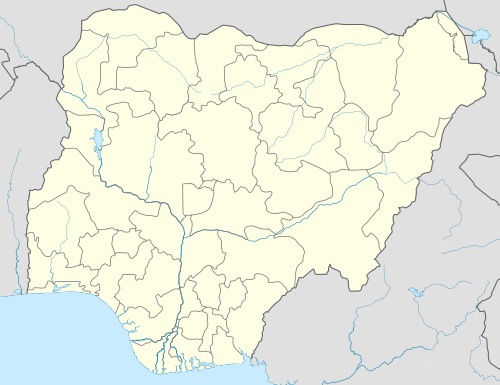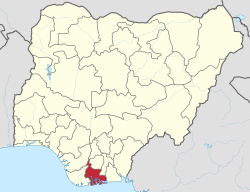Etche
Etche (Echie) is one of the Igbo groups in Rivers State, Nigeria.
Etche | |
|---|---|
Local Government Area | |
 Etche Etche shown within Nigeria | |
| Coordinates: 4.99°N 7.05°E | |
| Country | |
| State | Rivers State |
| Time zone | UTC+1 (WAT) |
Etche/Omuma is one of the 13 federal constituencies representing River State in Nigeria's National Assembly and part of the Rivers East Senatorial District. Okehi is the Council Headquarters and political capital of Etche, while Eberi is the political capital of Omuma.[1][2][3]
There are 19 political wards in Etche local government and 10 in Omuma. There are several communities and towns in Etche, some of which include Akwu/Obuor, Eberi, Amaji, Opiro, Chokocho, Igboh, Egwi, Afara, Mba, Igbodo, Ofeh, Ohimogho, Obiohia Umuogba, Umuajuloke Okehi, Obibi, Odufor, Nihi, Okomoko, Ulakwo, Umuakonu, Umuechem, and Egbeke. Etche believe Igbodo to be their ancestral home.
Economy
Umuechem - Etche is the second place oil was discovered in Nigeria since the beginning of exploration in the area in 1958. Today, Etche has over 250 producing oil wells and a host of flow stations. It is also said to have the largest deposit of natural gas, south of the Niger river. The people of Etche are mostly engaged in agriculture, earning the nickname 'the food basket of the state'. Etche is one of the host communities of the government owned multi-billion naira palm oil production company Risonpalm, as well as Delta Rubber Production Company. In recent times, real estate development has grown in the area with rapid expansion going on in Igboh-Agwuruasa, Ulakwo-Umuselem and Okehi Clans. [4] Cassava, plantain, banana and yam are important crops. Plantation agriculture (notably Rubber, palm oil, pineapple and plantain) was encouraged by the erstwhile Eastern Nigerian government but this has since lost steam. Agriculture is mostly not mechanized and the use of tractors for farming these crops has dropped slightly in the 1986–2004 period.[5] Manufacturing is absent. A rubber processing plant, the Delta Rubber Factory, in Okomoko, has been dormant for more than a decade. Informal activities dominate economic activities alongside agriculture. Mining of the rivers for sand is a new activity. Tourism is not developed and there is a complete absence of tourism infrastructure such as hotels in the two LGAs. Oil and gas are found in many parts of Etche. Umuechem was the second place, after Oloibiri, where oil was found in commercial quantities in Nigeria. Shell Petroleum Development Company, the dominant oil operator in the area since the late 1950s, has only funded a largely ineffective and inefficient cassava processing mill at Umuebulu, and in 2000 it attempted albeit abysmally to provide training to local women in operation and management of the mill.[6] Palm oil production by smallholders is a significant part of the economy.[7]
Political unrest
Etche and Omuma LGAs are historically among the most peaceful areas of Nigeria. The two militia groups DeyWell and DeyGbam mostly energized and enabled by local politicians in the area have rained terror - incessant attacks and loss of lives and properties on the Etche land and environs. Kidnapping, armed robbery, rape and fights for territorial control have become prevalent in the area with little or no attention from the state and federal governments in Nigeria. Etche ethnic nationality also has a history of political activism. In October 1990, a demonstration was held in Umuechem, Etche to demand social amenities and compensation for oil pollution. State security agents reacted with teargas and gunfire. 50 people died and about 550 houses were destroyed.[8] The April 2003 national elections were marked by serious violence and intimidation in the Etche LGA, seriously compromising the free voters process.[9] In a 2007 report, Human Rights Watch said that "in recent years Etche has earned a degree of unwelcome notoriety due to allegations of corruption, thuggery and murder leveled against politicians and public office holders from the area." The report stated that health and education facilities were in an advanced state of physical decay, with funds allocated for staffing and renovation being diverted for other purposes.[10] In January 2009 the Etche legislative council impeached three of their members for "irrational and unconscionable behaviour, gross misconduct, misappropriation of legislative fund and abuse of office."[11]
A training camp for ex-militants was established in Okehi in Etche LGA, teaching skills such as welding and fabrication, fitting, seafaring/marine, business and commerce and so on. In October 2009, 200 of the students demanded their allowances, threatening to return to the creeks to cause havoc if unpaid.[12]
Recent developments
In August 2009, a Marriage Registration Centre was opened in the LGA.[13] In September 2009 the Niger Delta Development Commission opened a free medical mission in Omuma Local Government Council.[14]
References
- Gloria Chuku, Gloria (2005). Igbo Women and Economic Transformation in Southeastern Nigeria, 1900-1960. Psychology Press. ISBN 9780415972109. Retrieved 18 February 2020.
- Augustine Senan Ogunyeremuba Okwu (2010). Igbo Culture and the Christian Missions, 1857-1957: Conversion in Theory Practice. Rowman & Littlefield. ISBN 9780761848844. Retrieved 18 February 2020.
- "Igo People and Irish People: A Trans-Atlantic Partnership By George C E Enyoazu At the 10th Anniversary of Ezinwanne, Drogheda, Co. Louth, Ireland". African Democrat. Retrieved 18 February 2020.
- Patrick Naagbanton (April 2, 1999). "SHELL'S TOXIC WAR AGAINST UMUAKURU-IGBO PEOPLE". ENVIRONMENTAL RIGHTS ACTION (ERA). Retrieved 2009-10-15.
- S.O. Nkakini; M.J. Ayotamuno; S.O.T. Ogaji; S.D. Probert (6 June 2006). "Farm mechanization leading to more effective energy-utilizations for cassava and yam cultivations in Rivers State, Nigeria". Applied Energy. 83 (12): 1317–1325. doi:10.1016/j.apenergy.2006.03.001. hdl:1826/1355.
- "REFERENCE TO OUR EXPERIENCES". Wetlands Associates. Archived from the original on 2011-07-18. Retrieved 2009-10-15.
- DI Ekine; ME Onu (2008). "Economics Of Small-Scale Palm Oil Processing In Ikwerre And Etche Local Government Areas Of Rivers State, Nigeria". Journal of Agriculture and Social Research. 8 (2). doi:10.4314/jasr.v8i2.43342.
- Adebola Babatunde Ekanola. "Terror Techniques in the Niger Delta and the Question of Justice" (PDF). The Journal of Sustainable Development in Africa (Jsda). Journal of Sustainable Development in Africa (Volume 9, No.2, 2007). ISSN 1520-5509. Retrieved 2009-10-15.
- "Report on Electoral Violence in the South South following the April 12th Senate and House of Representatives Elections". Idasa. Archived from the original on 2010-12-03. Retrieved 2009-10-15.
- ""Chop Fine" Impact of Local Government Corruption and Mismanagement on Primary Education and Primary Health Care in Rivers State" (PDF). Human Rights Watch. January 30, 2007. Archived from the original (PDF) on November 21, 2008. Retrieved 2009-10-15.
- Amadi Gilbert (January 25, 2009). "Etche Legislators Impeach Three Councilors". National Network. Retrieved 2009-10-15.
- Godfrey Azubike (14 October 2009). "Militants Threaten To Rock the Boat". NewsWatch. Retrieved 2009-10-15.
- Amadi Gilbert (August 23, 2009). "Etche LGA Gets Marriage Registration Centre". National Network. Retrieved 2009-10-15.
- "NDDC Takes Free Healthcare to LG". This Day. 9 September 2009. Retrieved 2009-10-15.
